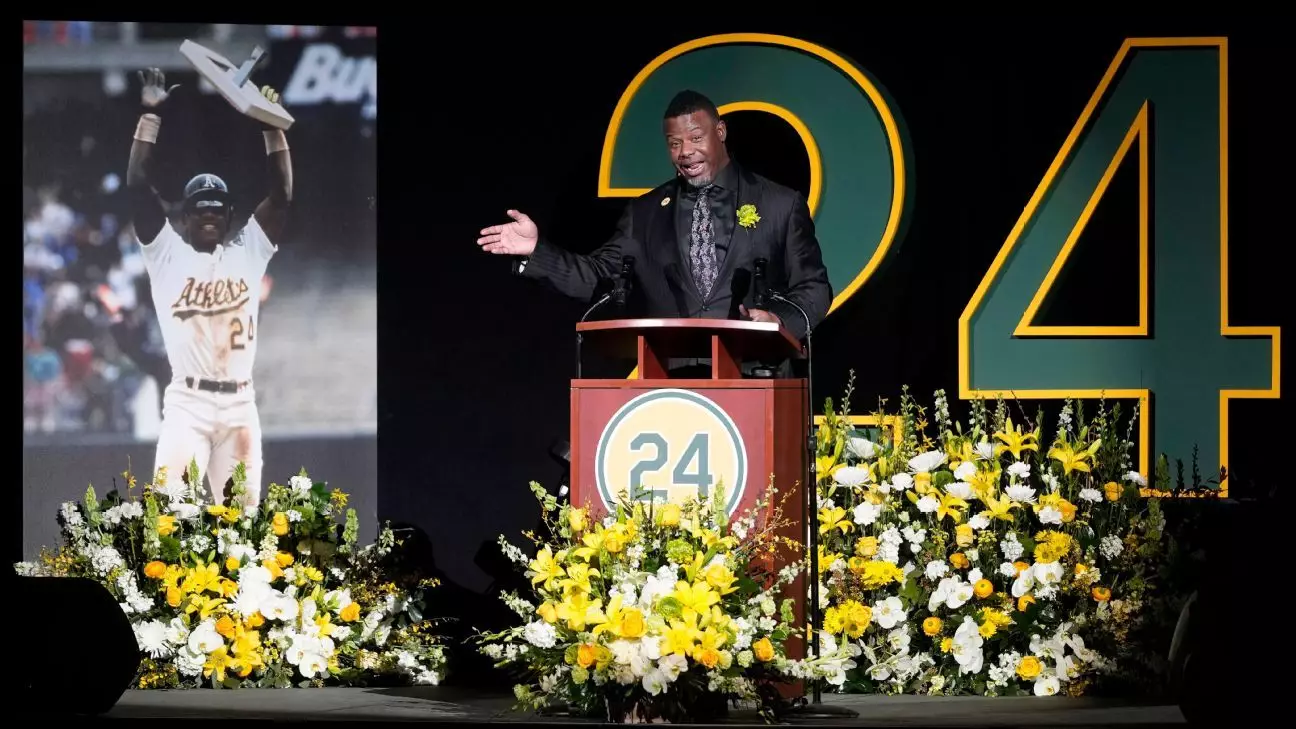In the world of baseball, mentorship can play a pivotal role in shaping the career of young talent. For Ken Griffey Jr., who would later ascend to the Hall of Fame, that mentoring presence came in the form of Rickey Henderson, a player renowned not just for his exceptional skills on the field but also for his magnetic personality. At 15, Griffey found himself immersed in the majestic culture of the New York Yankees clubhouse. It was a privilege few young players experience, yet the teenage Griffey focused not on his surroundings but rather on the relationships he forged, particularly with Henderson, who welcomed him warmly into the fraternity of baseball legends.
Henderson was no ordinary player; he was a disruptor on the base paths and an electric presence in the dugout. To Griffey, the lessons learned from Henderson extended beyond the basics of the game. As Griffey recounted, “It takes a village to raise a kid,” and he was grateful for the transitional figures, such as Henderson, who guided him during his formative years in baseball. This early exposure instilled in Griffey not only a deep respect for the game but a blueprint for his approach towards training, diligence, and ultimately, success.
The news of Henderson’s passing on December 20, 2024, came as a monumental loss to the sports community. Just shy of his 66th birthday, his legacy flooded the thoughts of fans, friends, and fellow athletes alike. Memorials poured in, with a gathering of nearly 3,000 attendees at an Oakland venue next to the Coliseum, where Henderson showcased his brilliance. Figures from across the sports landscape gathered to pay tribute, spanning generations and professional realms. The reverberating tone of loss was palpable, yet so too was the appreciation for having witnessed the remarkable journey of a Hall of Famer.
Among the attendees was Gary Payton, a Basketball Hall of Famer, who acknowledged the profound impact Henderson had even on athletes from other sports. Payton’s reflection underscored how Henderson’s determination and charisma transcended baseball, inspiring many to strive for excellence in their own pursuits. This cross-disciplinary admiration hints at Henderson’s status as not just a player but a cultural icon, a testament to the depth of his influence.
Dick Alderson, a former general manager for the Oakland Athletics, offered an eye-opening description of Henderson, who often initiated conversations with, “Rickey needs a new contract.” This candidness signifies Henderson’s larger-than-life personality, reinforcing the notion that he was much more than an athlete; he was a relentless self-advocate. Alderson’s reminiscing reveals the complexities of Henderson’s character—the dichotomy of being a dynamic player on the field while also being somewhat of a “pain in the neck” off it. Yet, those who knew him appreciated these nuances, recognizing that such bravado came from a genuine love for the game and a desire to uplift it.
Through anecdotes shared during the memorial, one can glean the fabric of Henderson’s existence. Consider Dave Stewart’s recollections from the 1989 World Series, where Henderson’s remarkable performance added color to an already striking narrative. Henderson’s playful jab about Stewart’s MVP showing highlights their camaraderie, but it also reflects Henderson’s watchful attentiveness to his peers, ever-the-mentor even in playful banter.
A Lasting Impact
Griffey’s recollections of his formative days spent training with veterans underscore the importance of nurturing emerging talent. Henderson’s awareness, acknowledging Griffey’s unique ability, serves as a reminder of how instrumental mentorship can be. Henderson’s practice of hitting balls to Griffey painted a vivid picture of investment in another’s potential. It was this kind of nurturing that shaped Griffey’s career, grounding him while simultaneously pushing him to reach for greatness.
Rickey Henderson’s legacy thus encompasses not just his record-breaking stats or his show-stopping plays but the indelible impact he had on those who were fortunate enough to cross paths with him. His story is one of inspiration, tenacity, and community. As the baseball world collectively mourns his loss, it reflects on a life well-lived—a life that blended athletic brilliance with warm-hearted mentorship. In a sport often categorized by individual achievement, Henderson’s narrative is a powerful testament to the significance of relationships that outlast the game itself.

